Suchergebnisse für "Factsheet: Energietechnologien gestalten, die für alle sinnvoll und nutzbar sind"
Low Tech – High Effect! Eine Übersicht über nachhaltige Low Tech Gebäude
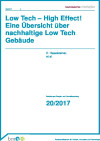
In dieser Studie wurden Ansätze von Low Tech Gebäuden näher betrachtet und besonders innovativ und repräsentativ erscheinende Konzepte detailliert dokumentiert. Ziel war es, den derzeitigen Stand der Technik und das vorhandene Know-how und Wissen anhand realisierter Beispiele aufzuarbeiten sowie Potenziale zur Weiterentwicklung aufzuzeigen.
Schriftenreihe
20/2017
Edeltraud Haselsteiner, Andrea Bodvay, Susanne Gosztonyi, Anita Preisler, Michael Berger, Bernhard Gasser
Herausgeber: BMVIT
Deutsch, 192 Seiten
Downloads zur Publikation
Evaluierung Visionärer Architekturkonzepte
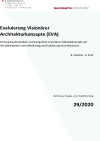
Prüfung bauphysikalisch und energetisch innovativer Gebäudekonzepte auf ihre Machbarkeit unter Monitoring und Evaluierung eines Mock-Ups.
Schriftenreihe
29/2020
B. Sommer, U. Pont, et al.
Herausgeber: BMK
Deutsch, 71 Seiten
Downloads zur Publikation
Optimierung der SOLARenergienutzung in URbanen Energiesystemen (URSOLAR)
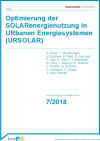
URSOLAR stellt EntscheidungsträgerInnen eine Roadmap zur integrierten urbanen Solarenergie-nutzung zur Verfügung. Es wird aufgezeigt, wie Photovoltaik (PV) und Solarthermie angepasst an infrastrukturelle und rechtliche Gegebenheiten in idealtypischen Stadtquartieren aus ökonomischer, ökologischer und sozialer Sicht sowie unter Berücksichtig von Stakeholder-Interessen optimal ge-nutzt werden können.
Schriftenreihe
7/2018
A. Posch, T. Brudermann, M. Buchner, E. Fleiß, D. Geringer, P. Hart, S. Hatzl, T. Kallsperger, G. Lang, T. Mayrold, E. Meißner, C. Reischl, G. Schnedl, S. Seebauer, K. Stöger, A. Würz-Stalder
Herausgeber: BMVIT
Deutsch, 137 Seiten
Downloads zur Publikation
MARGRET - Measurement of greened/non-greened objects for the adaptation of calculation models
Development of measurement methods to determine the influence of greening measures on greened versus non-greened reference objects with contemporary building standards under uniform framework conditions. Proposals for adaptations of calculation models or standards to e.g. enable an integration in the energy performance certificate.
FlexHP - AI-supported control models for optimising the flexibility of heat pumps to reduce the load on the electricity grid
Development of a new type of energy management system for heat pumps that enables methods for intelligent heat pump operation and thus maximises flexibility. This requires forecast-based models for control that utilise technologies such as machine learning.
LehmKur - Rammed earth walls for multi-storey residential buildings
Research of a lighthouse project consisting of rammed earth-timber exterior wall components with accompanying ecological life cycle analysis, building physics simulations and documentation of the necessary logistical, building law, fire and soundproofing measures.
Urbaner Kältebedarf in Österreich 2030/2050
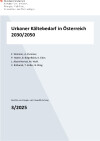
Systematische Aufarbeitung des steigenden Kühlbedarfs und Darstellung der geographischen Verortung des Kältebedarfs in Österreich. Das Ergebnis dient als Entscheidungshilfe bei der Entwicklung von Klimaschutzmaßnahmen und Klimawandelanpassungsstrategien sowie eine Abschätzung zum Kältebedarf der Zukunft.
Schriftenreihe
3/2025
F. Wimmer, A. Pummer, P. Holzer, B. Beigelböck, K. Eder, L. Abart-Heriszt, M. Wolf, C. Rzihacek, T. Keller, B. Kling
Herausgeber: BMK
Deutsch, 91 Seiten
Downloads zur Publikation
Designing Synergies. Spatial and Energetic Transformation Scenarios for Small Towns and Municipalities Using the Example of the Wagram Region (Lower Austria).
An interdisciplinary exploratory project that synergistically analyses strategies for the activation of vacant buildings and the potential for the formation of small-scale energy communities. The starting point is student projects from the Institute of Architecture and Design, TU Wien, for four municipalities in the Wagram region. On this basis, an interdisciplinary team of experts is developing a concept for a synergy cluster focussing on spatial energy planning, building physics, the circular economy and social innovation.
Machbarkeitsanalyse zertifizierte Plus-Energie-Quartier-Sanierung des denkmalgeschützten Otto-Wagner-Areals (OttoWagner-ArealPlus)
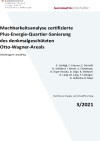
Entwicklung eines innovativen denkmalschutzverträglichen Sanierungskonzepts zur Transformation des Wiener Otto Wagner-Areals in ein Plus-Energie-Quartier. Das Jugendstil-Juwel umfasst eine Fläche von rund 50 Hektar, 70 Gebäude und eine Brutto-Grundfläche von rund 200.000 m². Der Lösungsansatz umfasst dabei höchste Energieeffizienz- und Komfortanforderungen.
Schriftenreihe
3/2021
K. Schlögl, C. Kresser, E. Schriefl, H. Schöberl, I. Artner, S. Chatterjee, D. Ürge-Vorsatz, D. Ürge, K. Stieldorf, F. Gharakhanzadeh, I. Stieldorf, G. Lang, M. Lang, T. Lebinger, G. Jedliczka, B. Mayr
Herausgeber: BMK
Deutsch, 162 Seiten
Downloads zur Publikation
Langzeitevaluierung des Energieverbrauchs von 100 energieeffizienten Gebäuden in Österreich als repräsentativer Querschnitt österreichischer Leuchtturmobjekte (LZE 100 Leuchtturmobjekte)
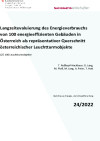
Erfassung, Auswertung und Analyse von Energieverbrauchsdaten von 100 energieeffizienten Gebäuden in Österreich über eine Betriebszeit von 3 bis 25 Jahren als repräsentativer Querschnitt der österreichischen Leuchtturmobjekte. Differenzierung nach Gebäudetypen, Energieträger und Ermittlung der realen Treibhausgas-Emissionen. Vergleich der gemessenen Verbräuche zu Benchmark-Werten.
Schriftenreihe
24/2022
T. Roßkopf-Nachbaur, G. Lang, M. Ploß, M. Lang, A. Peter, T. Hatt
Herausgeber: BMK
Deutsch, 143 Seiten
Downloads zur Publikation
AnergieLeichtGemacht - Development of Scalable Implementation Models for Geothermal Anergy Networks to Decarbonize the Building Sector
The project develops standardized technical, organizational, and financial implementation models for anergy networks to enable sustainable heating solutions in cities and municipalities. By identifying suitable settlement typologies, analyzing existing framework conditions, and engaging stakeholders, scalable solutions are created. The goal is to reduce planning and implementation barriers and facilitate investments in local anergy networks.
PersonAI - User-Centered AI-based energy services built on personal preference models
Conduct a large-scale, long-term study with 40-50 people to create personal comfort profiles to increase comfort in buildings. The personal comfort profiles will then be fed back into the building control system as input variables in a proof-of-concept.
MaBo - material saving in bored piles - a contribution to reducing CO2-emissions in the construction industry
Development of an innovative method for saving material in bored piles in order to reduce CO2 emissions in the construction industry. By optimizing the construction methods and using alternative materials, the sustainability of the foundation bodies is to be improved.
KliB40-Climate Compass: Climate-neutral Bregenz 2040, climate compass for the structured participation of stakeholders and the citizens
The "KliB40 Climate Compass" supports Bregenz on its path to climate neutrality by 2040 through transparent development, selection, and monitoring of measures. It facilitates the coordination of climate protection activities and actively involves stakeholders. By evaluating existing software solutions, the project ensures optimal digital support for planning and implementing the city's climate strategy.
#EEG++ Digital Energy Communities Optimized
The project aims to develop an innovative energy system for plus-energy neighborhoods by integrating advanced photovoltaic installations, IoT technology, and energy communities to maximize the self-consumption of renewable energy while ensuring economic efficiency and user-centricity.
DREI x NULL = NULL - Research project on climate-neutral construction in all life cycle phases based on three demonstration buildings
The aim of the F&E project is the realization of three different residential buildings, which are all climate-neutral in the life cycle phases of construction, operation and dismantling. The aim is to create exemplary showcase projects for the future residential construction sector.
ReBuildStock - Portfolio-Management zur Dekarbonisierung großer Wohnungsbestände
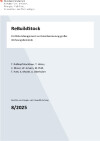
Portfolio-Managementmethode zur Unterstützung der Entscheidungsprozesse von Eigentümer:innen größerer Wohnungsbestände bei der Erarbeitung von Strategien zur schnellen und sozialverträglichen Dekarbonisierung ihrer Gebäudebestände.
Schriftenreihe
8/2025
T. Roßkopf-Nachbaur, T. Weiss, C. Moser, W. Amann, M. Ploß, T. Hatt, A. Mundt, A. Oberhuber
Herausgeber: BMK
Deutsch, 115 Seiten
Downloads zur Publikation
SIMPLE AD Evaluator - S.I.M.P.L.E. Sustainable Integration Modeling and Predictive Leveraging Evaluator
The SIMPLE AD Evaluator fills an existing gap in sustainable local planning by providing a low-threshold and collaborative evaluation tool for early planning phases. By linking questionnaires with System Dynamics models, the tool delivers well-founded decision-making foundations and customized sustainability checklists. This supports municipalities, project developers, and decision-makers in achieving a strategic and cost-efficient sustainable transformation from concept to implementation.
ReSpace – Reclaiming Spaces
ReSpace is developing an AI-based model for identifying, categorizing, and activating sealed areas. Existing data sources (aerial and satellite images, mobile network data, land registry entries) are integrated and enhanced with dynamic analysis to derive evidence-based recommendations for action.
Abwärme_4_Kapfenberg - 100 % industrielle Abwärmeauskopplung Kapfenberg
The project aims to explore the feasibility of maximizing industrial waste heat extraction into the district heating system of the municipality of Kapfenberg to foster the defossilization path.
